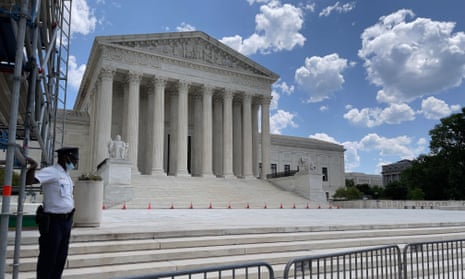The US supreme court agreed on Monday to consider a major challenge to reproductive rights, saying it will take up Mississippi’s bid to enforce a ban on almost all abortions after the 15th week of pregnancy.
It will be the first abortion case to come before the court since the confirmation of Justice Amy Coney Barrett, a devout Catholic, gave conservatives a 6-3 majority. It could lead to the landmark Roe v Wade precedent being gutted after nearly half a century.
The supreme court established a woman’s constitutional right to an abortion in the 1973 decision and reaffirmed it 19 years later in Planned Parenthood of Southeastern Pennsylvania v Casey.
The Mississippi law, enacted in 2018, was blocked by lower courts as inconsistent with supreme court precedent that protects a woman’s right to obtain an abortion before the foetus can survive outside her womb.
When the only abortion clinic in Mississippi, Jackson Women’s Health Organization, sued to try to block the measure, a federal judge in 2018 ruled against the state. In 2019 the New Orleans-based fifth US circuit court of appeals reached the same conclusion, prompting the state to appeal to the supreme court.
The court will hear arguments in the case in its next term, which starts in October, and may not arrive at a decision until the spring or summer of 2022 – setting up a politically explosive showdown months before the midterm elections for Congress.
Former president Donald Trump’s transformation of the judiciary included the appointment of three supreme court justices, most recently with Barrett replacing the late Ruth Bader Ginsburg, a liberal champion of reproductive rights.
Steve Vladeck, a law professor at the University of Texas, told CNN: “This will be, by far, the most important abortion case the court will have heard since the Casey decision in 1992.
“If states are allowed to effectively ban abortions after the 15th week of pregnancy, as the Mississippi law in this case does, then pregnant women would have a far shorter window in which they could lawfully obtain an abortion than what Roe and Casey currently require.”
Last June the court in a 5-4 ruling struck down an abortion law in Louisiana that imposed restrictions on doctors who perform the procedure. Ginsburg was still on the court at the time, and the conservative chief justice, John Roberts, voted with the liberal wing. Roberts explained that he did so because he felt bound by a 2016 ruling that struck down a similar law in Texas.
Anti-abortion groups welcomed Monday’s announcement. Marjorie Dannenfelser, president of Susan B Anthony List, said: “This is a landmark opportunity for the supreme court to recognise the right of states to protect unborn children from the horrors of painful late-term abortions.
“Across the nation, state lawmakers acting on the will of the people have introduced 536 pro-life bills aimed at humanising our laws and challenging the radical status quo imposed by Roe. It is time for the supreme court to catch up to scientific reality and the resulting consensus of the American people as expressed in elections and policy.”
But progressives said it illustrated the need to expand the court to offset an undemocratic rightwing bias. Jamaal Bowman, a Democratic congressman, tweeted: “The supreme court must reaffirm the right to an abortion by striking this law down using the precedent set by Roe v Wade.
“But, as a Congress, we must immediately reform and expand the supreme court to restore balance to the bench.”
Brian Fallon, executive director of the pressure group Demand Justice, said: “The only question is, will Democrats recognise the storm clouds that are gathering, or will they continue to dither and allow themselves to get soaked before ever reaching for an umbrella?
“We do not have 180 days to squander on a faculty-lounge discussion to tell us what we already know: the supreme court is a looming threat to our democracy and in urgent need of reform.”
Abortion rates in the US have steadily declined since the early 1980s, reaching the lowest levels on record in recent years, according to the non-profit Guttmacher Institute.
Nancy Northup, president and chief executive of the Center for Reproductive Rights, a global advocacy group, said: “Alarm bells are ringing loudly about the threat to reproductive rights.
“The consequences of a Roe reversal would be devastating. Over 20 states would prohibit abortion outright … Already, abortion is nearly impossible to access for people in states like Mississippi, where lawmakers have been chipping away at the right to abortion for decades.
“We will keep fighting to make sure that people do not lose this fundamental right to control their own bodies and futures”.
